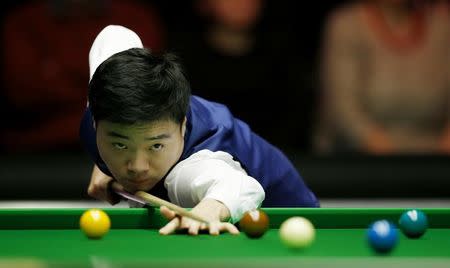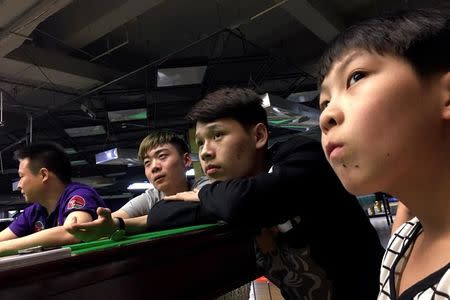Chinese snooker world watches idol Ding with high hopes
BEIJING (Reuters) - At the World Snooker College in Beijing, students train eight hours a day and the green felt tables rarely fall silent. But on Friday night, students and teachers put their cues down and crowded around a TV set to watch China's Ding Junhui battle England's Mark Selby to a 12-12 draw in the World Championship semi-finals. The finals on Saturday night, China time, are a chance for retribution for Ding, who became the first Asian to reach the world final last year before losing 18-14 to Selby. For the students, teachers and fans in China, it's a chance to watch their idol bring home glory and potentially provide a fillip to the game. Sixteen-year-old Wu Ze, one of the school's 24 students, has been at the China Billiards & Snooker Association facility since 2013. "He's not just a model for me, he's a model for all player in China. We all hope to be as successful as him," said Wu. If the past is anything to go by, millions will watch Ding in his homeland, where billiards has gained popularity. Ding told Eurosport before last year's match 100 million people in China would tune in. In 2015, World Snooker's commercial director Miles Pearce was quoted by the BBC as saying 60 million people in China regularly play snooker, where the game was seen as an "aspirational" sport. A win by world number four Ding could translate into even more Chinese interest in the game, said Wei Chunlong, a vice president of the school. "It would be ideal if he won it this year, but I'm confident that sooner or later Ding Junhui will take the world championship. But we really hope he wins it this year," Wei said. "Once he wins, it will have a sensational impact on all of billiards, especially snooker. There could be even more people to enter the sport." And if the sport gains players, that could easily translate into more Chinese contenders on the world stage. Zhang Dongtao, a teacher at the World Snooker College, says that remains his aim. He pushes students, he says, so they can eventually rival the world's best. "We want to contend with them, to prove that China's children aren't bad," said Zhang. "I think in the future - I don't know in how many years - this sport will belong to China." (Reporting by Thomas Suen; Writing by John Ruwitch; Editing by Amlan Chakraborty)

 Yahoo Sport
Yahoo Sport 








































